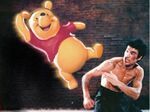The Tao of Pooh
The Tao of Pooh is possibly one of the most controversial books to reach the market this century about a piece of art called the Vinegar Tasters. Such subjects and themes include abortion, good vs. evil, passion, and the debate on whether or not kitten huffing is cleansing for the soul. It was written by J.R.R. Tolkien in the late 60's while under the influence of an orange kitten (thus inspiring one of the themes). It was nominated for many prizes such as the Newbery (but the Newbery was meant for children's books and The Tao of Pooh contains several physical combat scenes) but every time a mysterious stranger sabotages it all.
Summary[edit]
A Brief History[edit]
When The Tao of Pooh was first written, the French Revolution had swept across Japan. Times were tough; there was a shortage of originality and muffins, pies, cheese and cows flooded the streets. Only the eight year olds and younger were unaffected, who still thought it was funny. The remaining group of intelligent people performed their civic duty to repopulate the planet but were deprived of fine entertainment. Seven generations later a local group (with Tolkien as its leader) formed their own college and educated themselves, and started writing because no one else would. This is partially the reason for Tolkien's success. Finally he stole himself a nice plump kitten and "inspired" himself.
Analysis[edit]
Because people were going through rough experiences they could easily relate to the book's twists and turns, such as the fight scene with various martial artists and Pooh. In the chapter titled "Escpape", Pooh prepares to pack his belongings and run away to the big city. However he breaks down and realizes that happiness can only be found deep inside, just like they taught you in kindergarten. You don't really believe that bull, right? His inevitable decision can be linked to the subject of passion. It doesn't really have anything to do with it but a lot of good books have it or something like that.
At the climax of the book, Pooh gets high and goes on a road rage to kill all in his path. He is stopped only by the sight of the wandering Piglet. The transformation of a drunk, ruthless killer to a sweet caring friend is much like Jesus (Jesus had a motorcycle gang called The Holy Motorbitches). The theme of kitten huffing being good or bad for the soul is brought up when, on the next to last page, Eeyore finds a stray, homeless kitten. He's in need of a high and gets out his old, beat up pipe. Pooh is fascinated but Piglet turns away and wretches on Pooh's new shoes. This causes Pooh to take out a semi automatic and shoot the shit out of the... whatever the hell he is. The real debate is that had kitten huffing been good for the soul, would Piglet be disgusted? This is talked over and over in heated discussions around the world and a rumor is circulating that there is a Google group regarding it.
Trivia[edit]
- On page 127, after the word "listings" there is a small dot of paint, seeming like a misprint. Actually, this dot, when examined, shows a likeness of Tolkien's cousin, Beth.
- When the book first came off the press, 500 first-edition copies were in circulation. However, before they even made it to the stores a lesbian in a bikini held up the truck carrying them. There are no first-edition copies anymore; they have been burned by the madman's wife (also wearing a bikini).
- The Gettysburg Address was written on the back of the last page of The Tao of Pooh. A hardcore fan of the book thought this was obscene and was motivated to assassinate Lincoln, contrary to popular belief.
- Though the inspiration for this book was kitten huffing, the inspiration to huff a kitten was through Mount Terror.
- Tolkien wrote the book without using the letter "e", once.
- An ancient cult is said to have revolved around this book, but this has been proved wrong after the cult came and publicly stated that they revolve around Playboy, not The Tao of Pooh.
